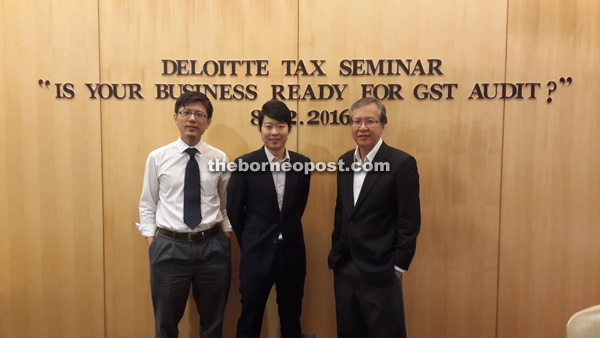
(From right) Koh, Bong and Deloitte partner Wong King Yu had a photo session after the tax seminar yesterday.
KUCHING: Businesses are advised to be well-prepared for Goods and Services Tax (GST) audit next year.
In making the call, Deloitte Tax Services Sdn Bhd’s (Deloitte) Indirect Tax Clients and Markets Leader Koh Siok Kiat believed the Customs Department of Malaysia (Customs) will increase its audit activities in view of the higher GST collection for 2017.
He noted that Customs is expected to collect RM38 billion in GST for this year and is targeting to collect additional 10 to 15 per cent for next year.
Koh said more audit activities will be conducted by the Customs to meet the target amount.
Hence, he encourages businesses to ensure that their GST returns and payment are in compliance with the requirements to avoid being penalised.
“Customs are going to have more audit activities and comprehensive checks next year.
“Their audit level will be tightened and the audit will be more focus and comprehensive.
“Moving into next year, the late payment penalty will go up to 40 per cent,” he briefed clients during a tax seminar entitled: ‘Is your business ready for GST Audit?’ at a hotel here yesterday.
Koh urged the business community to improve their internal work processes, preprare the necessary documentations and set up a system for GST monitoring.
Elaborating further, businesses should synchronise reporting requirements into GST reporting system and set standard operating procedures.
He also advised businesses to review their control process and coordination between different departments in minimising errors on GST reporting.
Citing an example, he said in marketing or sales, some companies might use promotions such as free gifts or buy one free one strategy to attract customers and generate sales.
Noting this, he outlined that businesses must make sure that the promotional strategy does not attract GST.
“Be very careful when issuing tax invoices. When issuing invoices in foreign currency, it must also state the exchange rate and the equivalent amount in ringgit.
“This will faciliate the other party to know the input tax,” he explained.
Additionally, Koh advised businesses to create spreadsheets to reconcile the figures in the business accounting system with the GST reporting requirement.
He stressed that the penalty of late payment of GST is very serious.
Besides that, he also encouraged businesses to make a checklist on GST audit and perform the necessary checking.
Furthermore, Koh shared that businesses must notify the Customs of the change in taxable period due to change in turnover.
During the tax seminar, Koh also highlighted several issues in relation to GST.
Those include errors, adjustments, GST refunds, procedural and compliance error, extension of the Anti-Profiting Framework and so forth.
He expounded that some of the errors include failure to capture deemed supplies, failure to capture non-trade supplies, tracking of consignment stock, incorrect treatment on recharges and so on. He added with the Customs Blue Ocean Strategy (CBOS), an approach to make the deparment more efficient and effective, there will be wider audit as Customs is looking to ensure tax collection and compliance by businesses.
Meanwhile, Deloitte’s senior tax manager Kane Bong shared about the different types of audits conducted by the Customs, reporting on GST adjustments and the practices when audit officers came to check on business premises.
“Audit is actually inevitable. (Thus), businesses need to improve their internal system,” he said.
Moreover, he advised businesses to have proper records keeping and ensure the documents are in order.
When Customs officers come to a business premise for audit, businesses are encouraged to cooperate with the officers by providing the required information and tend to their queries.
Bong noted that under the GST law, a business can be evaluated and accessed by auditors up to six years.
Lastly, Bong and Koh pointed out that Deloitte is committed to assist its clients and the business community to ensure GST compliance.
